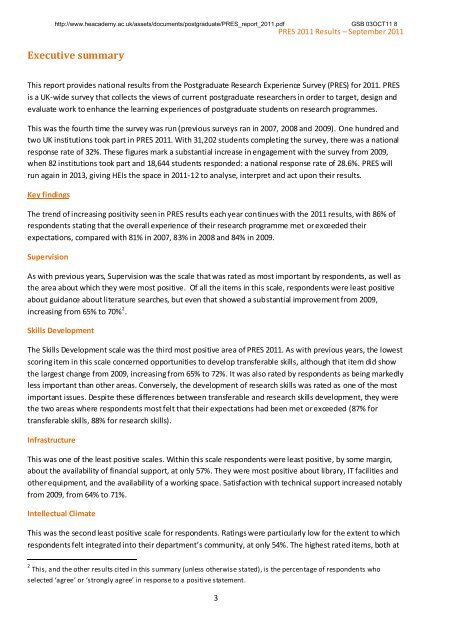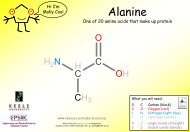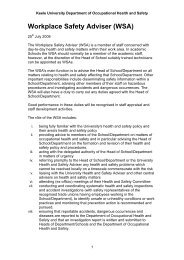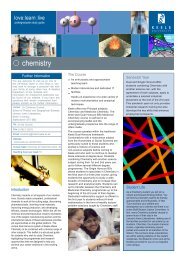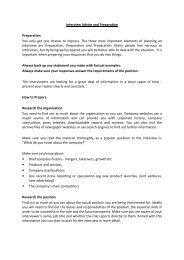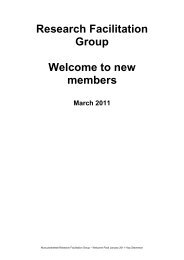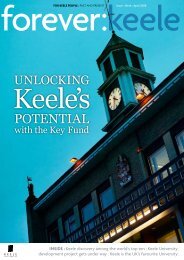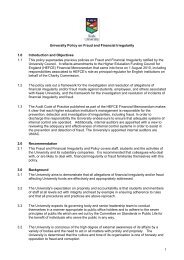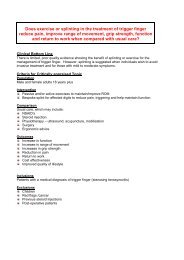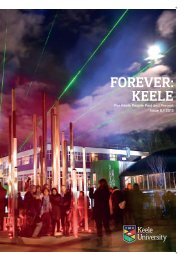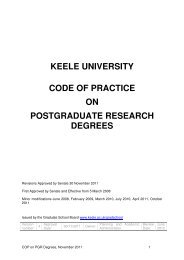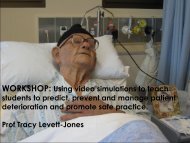Executive summary
Executive summary
Executive summary
Create successful ePaper yourself
Turn your PDF publications into a flip-book with our unique Google optimized e-Paper software.
http://www.heacademy.ac.uk/assets/documents/postgraduate/PRES_report_2011.pdf GSB 03OCT11 8<br />
<strong>Executive</strong> <strong>summary</strong><br />
PRES 2011 Results – September 2011<br />
This report provides national results from the Postgraduate Research Experience Survey (PRES) for 2011. PRES<br />
is a UK-wide survey that collects the views of current postgraduate researchers in order to target, design and<br />
evaluate work to enhance the learning experiences of postgraduate students on research programmes.<br />
This was the fourth time the survey was run (previous surveys ran in 2007, 2008 and 2009). One hundred and<br />
two UK institutions took part in PRES 2011. With 31,202 students completing the survey, there was a national<br />
response rate of 32%. These figures mark a substantial increase in engagement with the survey from 2009,<br />
when 82 institutions took part and 18,644 students responded: a national response rate of 28.6%. PRES will<br />
run again in 2013, giving HEIs the space in 2011-12 to analyse, interpret and act upon their results.<br />
Key findings<br />
The trend of increasing positivity seen in PRES results each year continues with the 2011 results, with 86% of<br />
respondents stating that the overall experience of their research programme met or exceeded their<br />
expectations, compared with 81% in 2007, 83% in 2008 and 84% in 2009.<br />
Supervision<br />
As with previous years, Supervision was the scale that was rated as most important by respondents, as well as<br />
the area about which they were most positive. Of all the items in this scale, respondents were least positive<br />
about guidance about literature searches, but even that showed a substantial improvement from 2009,<br />
increasing from 65% to 70% 2 .<br />
Skills Development<br />
The Skills Development scale was the third most positive area of PRES 2011. As with previous years, the lowest<br />
scoring item in this scale concerned opportunities to develop transferable skills, although that item did show<br />
the largest change from 2009, increasing from 65% to 72%. It was also rated by respondents as being markedly<br />
less important than other areas. Conversely, the development of research skills was rated as one of the most<br />
important issues. Despite these differences between transferable and research skills development, they were<br />
the two areas where respondents most felt that their expectations had been met or exceeded (87% for<br />
transferable skills, 88% for research skills).<br />
Infrastructure<br />
This was one of the least positive scales. Within this scale respondents were least positive, by some margin,<br />
about the availability of financial support, at only 57%. They were most positive about library, IT facilities and<br />
other equipment, and the availability of a working space. Satisfaction with technical support increased notably<br />
from 2009, from 64% to 71%.<br />
Intellectual Climate<br />
This was the second least positive scale for respondents. Ratings were particularly low for the extent to which<br />
respondents felt integrated into their department’s community, at only 54%. The highest rated items, both at<br />
2 This, and the other results cited in this <strong>summary</strong> (unless otherwise stated), is the percentage of respondents who<br />
selected ‘agree’ or ‘strongly agree’ in response to a positive statement.<br />
3
PRES 2011 Results – September 2011<br />
65%, concerned the opportunities for social contact with other research students, and the departmental<br />
seminar programme.<br />
Goals and Standards<br />
This was a scale that had relatively little importance to respondents. They were most positive about<br />
understanding the standard of work expected (79%), while they expressed most concern about understanding<br />
the requirements of the thesis examination (67%).<br />
Thesis Examination<br />
Only students who had sat their final viva voce examination responded to these items: less than one<br />
respondent in 20. Those that did respond were very positive about the fairness of the examination process,<br />
and this positivity was a clear improvement on 2009, an increase from 78% to 84%. They were least positive<br />
about support for preparation in advance of the viva voce, but again this was an increase from 2009, from 62%<br />
to 71%. The item in the survey that received the greatest increase in positivity compared with 2009 was in this<br />
area: positivity about the support received for post-viva voce thesis corrections increased from 67% to 77%.<br />
Professional Development and Career<br />
Since it was introduced in 2008 this has been the least positive scale of the survey. Respondents were<br />
considerably more positive about encouragement to think about career opportunities than in 2009, an<br />
increase from 37% to 44%, but that was still the issue about which they expressed most concern.<br />
Roles and Responsibilities<br />
Respondents felt clear about their responsibilities as postgraduate researchers (80%), but they were<br />
unconvinced that their institution values and responds to student feedback (57%).<br />
Teaching Opportunities<br />
While not very many respondents felt they had adequate opportunities to gain teaching experience (although<br />
the proportion increased from 49% in 2009 to 58% in 2011), those that had had the opportunity generally felt<br />
it was worthwhile (71%). There was a marked lack of positivity, however, about the support and guidance they<br />
had received (51%).<br />
Personal Factors<br />
Within this diverse group of items, most positivity was expressed about support from friends and family: this<br />
received the most agreement of all the items on the survey, at 89%.<br />
Motivations<br />
http://www.heacademy.ac.uk/assets/documents/postgraduate/PRES_report_2011.pdf GSB 03OCT11 8<br />
As with previous years of PRES, the two most common motivations to pursue a research degree programme<br />
were an interest in the subject (37%), and improving academic or research career prospects (31%).<br />
Anticipated Career<br />
Nearly half of respondents anticipated a career in higher education consisting of either teaching alone, or<br />
research and teaching (44%). 13% of respondents anticipated a research-only career in HE, and 43%<br />
anticipated a career outside HE.<br />
4


